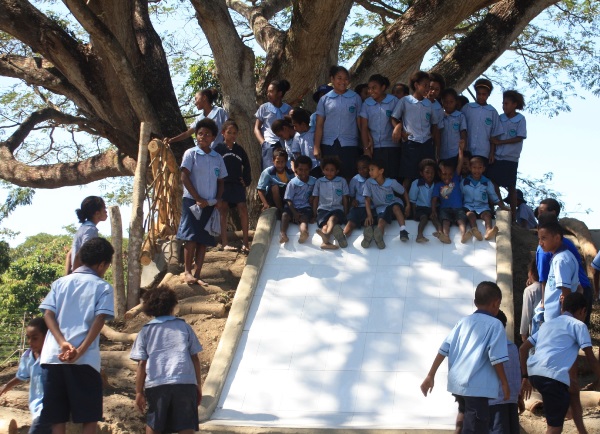Marcus Butler
21 December 2015: School attendance is on the rise in one Papua New Guinea (PNG) school and its new playground could be the reason behind the change. A University of Canberra-led international research collaboration has found that something as simple as building playgrounds at a school can make a difference in children attending school regularly.
University of Canberra assistant professor in early childhood and primary education Kym Simoncini said that school non-attendance is a problem across PNG with many students only attending for a day or two a week.
"Only 55 per cent of primary age children are enrolled in school and half of them will drop out by Year 6," she said.
During a visit to PNG, Dr Simoncini noticed schools lacked playgrounds.
"In PNG, schools typically have open, grassed areas for students to run around; there's none of the play equipment that you associate with an Australian primary school," Dr Simoncini said.
"My project has resulted in a pilot playground for a school in Port Moresby and it was created by the local community using up-cycled items. We worked with the community to build the playground, hopefully inspiring other communities to do the same."
Dr Simoncini added the pilot is already producing positive results with kids overly keen to get to school each day.
"The playground design grew out of our community consultation with kids, parents and teachers. We really wanted to build the playground that they wanted and suited the games they already play, that's a big part of why it's been such a success," she said.
"We are hearing that kids are ready for school at 6am, well before classes begin, and that they are coming every day instead of arriving late on the one or two days a week that they attend. It's just amazing.
"We are confident that the lessons we're learning out of the project can also be applied to schools in Australia, where attendance is low, such as in remote communities.
"Play enhances all areas of child development - social-emotional, physical, cognitive and language development coupling that with encouraging more kids into structured education is going to benefit the children and their communities for many years to come," Dr Simoncini said.
Dr Simoncini's project is a collaboration between the University of Canberra, Pacific Adventist University, University of Cincinnati and the University of New England.
Construction of another playground will get underway in 2016 at a demonstration school, which operates at a local primary teaching college. It's being built by carpentry and building apprentices from across PNG, who can take the concept and some new skills back to their home villages.



